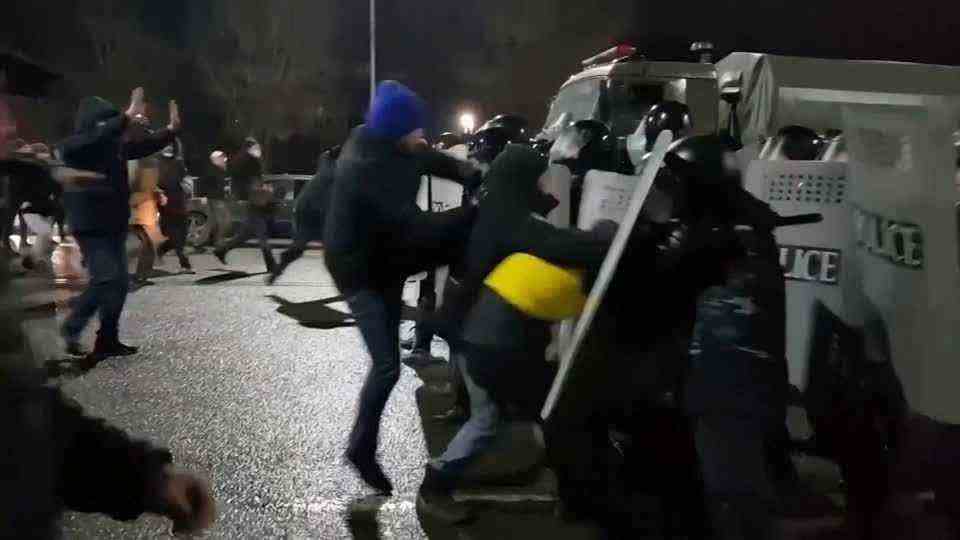Bloody riots
“Protests were stolen”: In Kazakhstan, not only ordinary citizens are said to have demonstrated
The riots left their mark on Kazakhstan: A car that was set on fire during the riots on a street in Almaty.
© Vasily Krestyaninov / DPA
After a bloody week of protest, Kazakhstan is about to come to terms with the events. It is becoming increasingly clear that the security forces did not only act against ordinary citizens. The President speaks of an attempted coup – but is that true?
The Kazakh city of Almaty is being cleaned up: Burned-out cars are towed away, shop assistants are sweeping up broken pieces in front of their looted shops. A week of the most serious riots with skirmishes between security forces and demonstrators has left its mark. The situation is slowly stabilizing – and the extent is also becoming clear on the streets. “The pictures of the destroyed city are really terrible,” writes a resident of the German press agency.
It is now becoming clear that the destruction is by no means just a result of the displeasure of average citizens about the rise in fuel prices, corruption and authoritarian governance. The balance of power in Kazakhstan has at least shifted after this week that killed many people.
“Protests were stolen from organized criminal group”
Kazakh experts increasingly agree that, in addition to many peaceful demonstrators, there were apparently organized violent rioters – especially in Almaty, Kazakhstan’s largest city and its economic center. These two groups should be strictly separated, emphasizes the sociologist Diana Kudajbergenowa, who teaches at Cambridge University, on Twitter. “In Almaty, peaceful protests were stolen from organized criminal groups.”
Residents reported gunshot noises and rampaging mobs roaming the streets. Several arms shops were looted. A video is circulating on the Internet of men snatching guns from the trunk of a car. “As of January 4th, storm troops prepared in advance played the main role, and they were out for violent confrontation without any slogans,” writes Kazakh political scientist Danijar Ashimbayev.
As an indication of a coordinated approach, experts see above all that strategically important points such as police stations and administrative buildings were attacked in a targeted manner. This rapid radicalization of the protest can not only be explained by the spontaneously escalated anger of young men on the streets, according to an analysis by the Moscow Carnegie Center. The Russian daily “Kommersant” is also surprised at the overwhelming demands and powerlessness of the Kazakh authorities against the rioters.
Kazakhstan is sinking into chaos – the images of a state of emergency
13 images
“This is an attempted coup,” said President Kassym-Shomart Tokayev. Russian President Vladimir Putin speaks of “destructive forces from outside” at a meeting of a Moscow-led military alliance now deployed in Kazakhstan. So far there is no evidence of this.
The power struggle in Kazakhstan has been going on for a long time
A power struggle between President Tokayev and his former foster father, long-term ruler Nursultan Nazarbayev, who resigned in 2019, had already sparked a long time ago – largely unnoticed by the public – the Carnegie experts write. Apparently there were people in the country who didn’t like the fact that Tokayev had become more powerful, says the political scientist Marat Schibutow. “Whatever it is, it is an internal struggle,” wrote political scientist Nargis Kassenova on Twitter during the unrest.
Tokayev had a protégé of Nazarbayev, ex-secret service chief Karim Massimov, arrested. Tokayev has also dismissed numerous other Nazarbayev confidants, the entire government and Nazarbayev himself – from the post of head of the influential Security Council. Tokayev took over. It was not until days later that Nazarbayev spoke up, who until the beginning of the protests was still considered the most powerful man in the ninth largest country on earth and a puller in the background. The 81-year-old reported that he had voluntarily vacated the post.

It is too early to judge whether, as Tokayev says, it was really an attempted coup. And if so, who instigated it. What is clearer, however, is that the former diplomat is clearly using the crisis to expand his own influence. “The most important thing is obvious: the Nazarbayev era has come to an end in Kazakhstan,” says the Carnegie report.
The price for Tokayev’s new power could be great: increased Russian influence, for example – and that about 30 years after independence from the Soviet Union. In the turmoil of the first days of protest, business people also left the oil- and gas-rich country in droves for fear of upheaval, writes the expert Schibutow. “Everyone who could has flown away.” For Tokayev, it is now a matter of keeping as many investors as possible in the country.
For the population, however, it is now a matter of coming to terms with the events, especially for those who took to the streets peacefully for improvements in their country. “The Kazakh government owes us the truth, in full and in full,” writes political scientist Kassenova. “People are not stupid, they are mad.”

